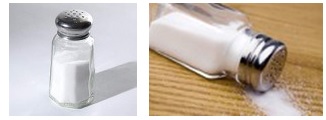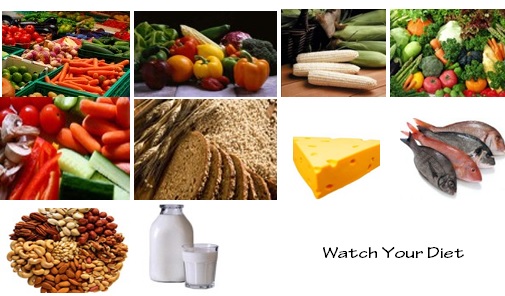2. Cut down on salt: Too much salt can cause high blood pressure, which increases the risk of developing coronary heart disease.
3. Watch your diet: Try to have a balanced diet. Eat fresh fruits and vegetables, starch foods such as wholegrain bread and rice.
- Eat foods rich in beta-carotenes. They can cut your risk of a stroke by 40 percent. Foods rich in beta-carotenes include carrots, cabbage, winter squash, sweet potatoes, dark leafy greens, apricots, and seaweed.
- Eat garlic: Study after study has confirmed garlic’s abilities to lower blood pressure, reduce phospholipids and cholesterol, strengthen heart action, increase immune response, reduce platelet clumping and clotting (thus reducing strokes) and stabilize blood sugar levels. Eat garlic raw or lightly cooked, several cloves a day.
- Eat foods rich in essential fatty acids. Fresh pressed oils of wheat germ or flax seed are especially for nourishing.
- Avoid restrictive diets. Frequent dieting, fasting, binging and purging imbalance your electrolyte levels, causing weakening of the heart muscle and damage to the heart.
- Eat as much as you want of whole grains, vegetables, beans, greens, fruits, fish, seeds, and yogurt.
- Go easy on nuts, cheese, and milk.
4.Monitor your alcohol: gradually decreasing the consumption. Too much alcohol can damage the heart muscle, increase blood pressure and also lead to weight gain. Avoid intake of alcohol or at least limit it to one to two units a day.
5.Get active: At least aim for 30 minutes of moderate exercise a day. Keeping yourself fit not only benefits the heart but also improves mental health and well-being.
6. Manage your weight: Cholesterol deposition in blood vessels begins in the first decade of life. Carrying a lot of extra weight as fat can greatly affect your health. Make small but healthy changes in your diet.
7. Monitor your BP, blood sugar and cholesterol levels: The higher your blood pressure, the shorter your life expectancy. People with high blood pressure run a higher risk of having a stroke or a heart attack. High levels of cholesterol in the blood – produced by the liver from saturated fats – can lead to fatty deposits in your coronary arteries that increase your risk of coronary heart disease, stroke, and diseases that affect the circulation. You can help lower your cholesterol level by exercising and eating high-fibre foods. Routine medical check-ups will ring an alarm, if you need medical help.
8. Learn to manage your stress levels: If you find things are getting on top of you, you may fail to eat properly, smoke and drink too much. This may increase your risk of a heart attack. Practice yoga/meditation. Take a vacation.
9. Check your family history: If a close relative is at risk of developing coronary heart disease from smoking, high BP, high cholesterol, lack of physical activity, obesity and diabetes, then you could be at risk too.
10. Laughter is the best therapy: Laughter anytime will work wonders for you. It is an instant way to unleash the pressure and it makes you feel light.
Dr Gopala Krishna Gokhale, one of the best heart transplant surgeons in Hyderabad – Gives 10 tips for a healthy heart . A healthy heart is always safe for people of all ages. It protects us from various heart diseases.
 Ask Doctor
Ask Doctor










